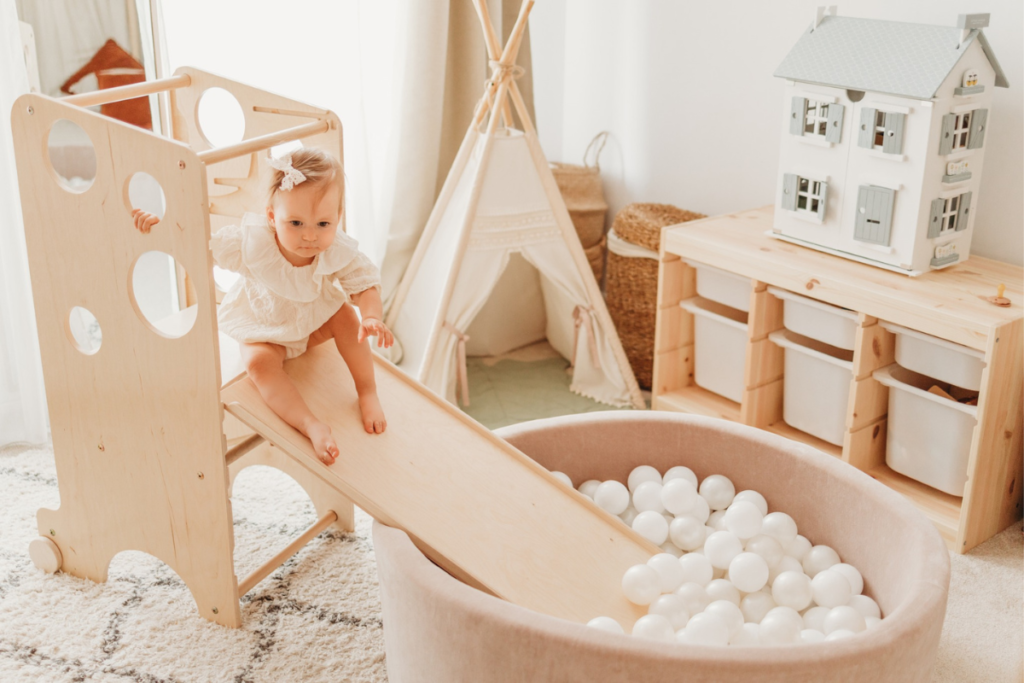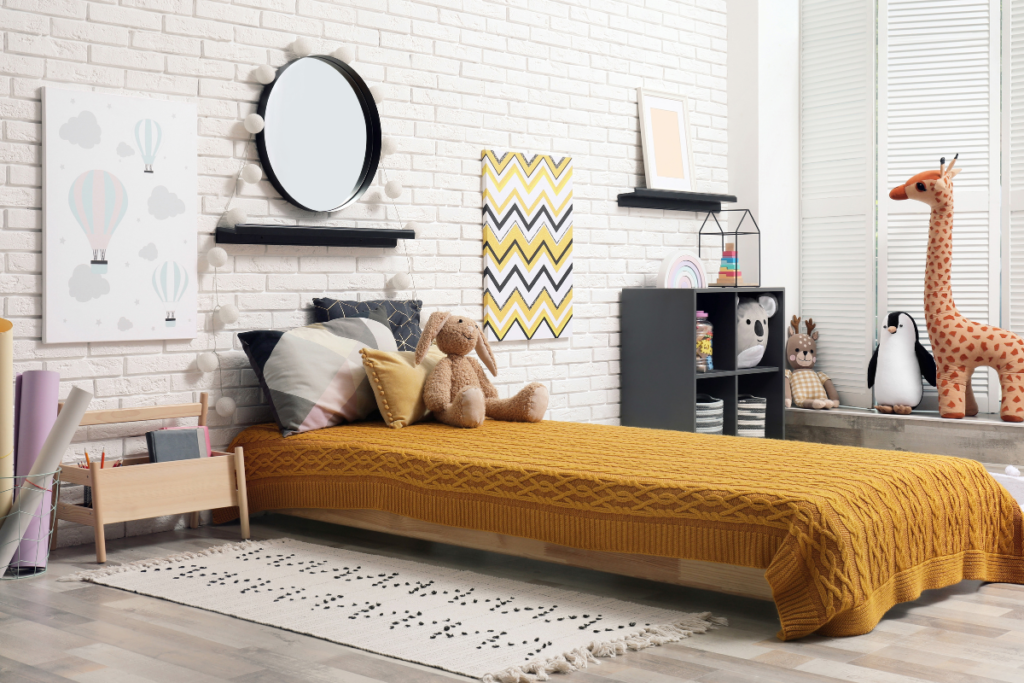Do you want to avoid constantly picking up your child’s clothes or needing help finding an organized system for their wardrobe? Look no further than the Montessori clothes rack, a practical and child-sized solution that promotes independence and organization.
Inspired by the Montessori philosophy, the Montessori clothes rack empowers children to take charge of their own clothing. Its child-sized design allows kids to easily hang and manage their clothes, fostering independence, decision-making, and responsibility.
Key Takeaways:
- Montessori clothes racks are child-sized and promote independence in children.
- They provide a practical solution for organizing kids’ clothes.
- The Montessori clothes rack teaches essential life skills such as organization and responsibility.
- It follows the Montessori philosophy of simplicity and accessibility for children.
- A Montessori wardrobe can include additional accessories like a full-length mirror, shoe shelf, and clothes hamper.
Embrace the Montessori Method of Organization
When it comes to organizing your kids’ clothes, embracing the Montessori method can offer a practical and efficient solution. One key element of this approach is the use of a wooden clothes rack explicitly designed for children. This child-sized rack promotes independence and allows your little ones to take responsibility for their own wardrobe.
A Montessori clothes rack is not just a storage solution but also an educational tool. By having their own accessible clothing storage on a child-sized rack, kids can learn essential life skills such as organization, decision-making, and responsibility. They can easily hang and manage their own clothes, fostering a sense of independence and self-sufficiency.
Wooden clothes racks are a popular choice for Montessori wardrobes due to their durability and eco-friendly nature. They blend seamlessly into any child’s room decor and provide a visually appealing storage solution. With their simplicity and accessibility, Montessori clothes racks offer a practical and effective toddler wardrobe solution that promotes independence and organization.
Embrace the Montessori Method and Enjoy Its Benefits
The Montessori method of organization goes beyond just clothes racks. It encourages a child-centric approach to setting up your little one’s space, creating an environment that promotes exploration, independence, and learning. By embracing this method, you can help your child develop important life skills while keeping their room organized and clutter-free.
“The child is both the hope and the promise for mankind.”
With a Montessori-inspired wardrobe, your child can easily access their clothes, learn to make choices and grow in confidence as they take ownership of their personal style. By providing a child-sized clothes rack and incorporating other Montessori principles into their room design, you can create a space that nurtures their independence and fosters a sense of responsibility from a young age.
Teach Life Skills with a Montessori Clothes Rack
The Montessori clothes rack is more than just a storage solution; it is an educational tool that teaches children essential life skills. By providing children with their own accessible clothing storage on a child-sized rack, they learn the importance of organization, decision-making, and responsibility in managing their wardrobe.
With a Montessori clothes rack, kids can actively participate in dressing themselves and selecting their outfits. They can learn to hang their clothes neatly and organize their closets. This not only promotes independence but also instills a sense of ownership and responsibility for their personal belongings.
Children develop important life skills that extend beyond just clothing organization using a Montessori clothes rack. They learn to make choices, develop their style, and express themselves through clothing. This fosters creativity and self-confidence, allowing children to create their own sense of identity and autonomy.
Teach Life Skills with a Montessori Clothes Rack
Table: Comparison of Traditional Clothes Storage vs. Montessori Clothes Rack
Traditional Clothes Storage Montessori Clothes Rack
Adult-sized wardrobe and hangers Child-sized rack and hangers
Adult-dependent clothing selection Child-independent clothing selection
Less opportunity for decision-making Encourages decision-making skills
May result in disorganized closets Promotes organization and tidiness
“The Montessori clothes rack not only fosters independence in children but also teaches them valuable life skills. It encourages them to take ownership of their clothes and closet organization, promoting decision-making and responsibility.”
With a Montessori clothes rack, children gain a sense of accomplishment and pride in their ability to manage their own wardrobe. This practical and educational solution creates a positive and empowering environment for children to develop essential life skills while embracing independence and organization.
The Philosophy Behind the Montessori Wardrobe
The Montessori wardrobe is designed with simplicity and accessibility in mind. It follows the Montessori philosophy of fostering independence in children by providing them with a wardrobe they can easily navigate independently. Drawers and doors are intentionally left out to eliminate obstacles and allow children to dress themselves without adult assistance.
Simplicity and Accessibility
The Montessori wardrobe embraces the principle of simplicity. Removing unnecessary elements like drawers and doors creates a clear and uncluttered space for children to interact with their clothing. This minimalist approach fosters independence, as children can easily see and reach their garments without the need for adult intervention. The absence of barriers also promotes a sense of autonomy, allowing children to choose their outfits and develop their personal style freely.
Accessibility is a key component of the Montessori wardrobe. The hanging rod is set at a height within reach of children, typically between 3-3.5 feet from the floor. This ensures that they can hang and retrieve their clothes without assistance. The wardrobe’s open design also allows children to easily scan and select their clothing, further enhancing their decision-making skills and fostering a sense of responsibility for their belongings.
The Montessori philosophy recognizes that children thrive when provided with an environment that supports their natural inclination for independence and exploration. The simplicity and accessibility of the Montessori wardrobe align with this philosophy, empowering children to take ownership of their personal space and clothing choices. By embracing these principles, parents and caregivers can create a nurturing environment that encourages their children’s development of life skills and self-confidence.
The Components of a Montessori Wardrobe
A Montessori wardrobe consists of a hanging rod and shelves or baskets for folded clothes. The hanging rod is set at a height that is easily accessible for children, typically between 3-3.5 feet from the floor. This allows them to hang their clothes independently. The shelves or baskets should also be at a height children can reach comfortably, allowing them to fold and organize their clothes quickly.
A Montessori wardrobe encourages children to develop practical life skills such as hanging and folding clothes. By having their own accessible clothing storage on a child-sized rack, kids can learn to take care of their clothes and keep their closet organized.
Different families may have different systems for organizing clothes within a Montessori wardrobe. Some may choose to hang clothes in rainbow color order. In contrast, others may prefer to have separate baskets for each item of clothing. The key is to create a system that works for your child and promotes independence and organization.
Additional Accessories for a Montessori Wardrobe
Along with a Montessori wardrobe, several additional accessories can enhance the functionality and organization of the space. These accessories are designed to promote independence in children and create an environment that encourages responsibility and self-sufficiency.
A Full-Length Mirror
One essential accessory for a Montessori wardrobe is a full-length mirror. This allows children to see themselves as they dress and promotes self-awareness and independence. Having a mirror at their eye level will enable children to easily assess how their clothes fit and make their own adjustments if needed.
A Shoe Shelf
Another valuable addition to a Montessori wardrobe is a low shelf for shoes. This encourages children to remove their shoes when entering the house and provides a designated place to store them. Instilling this habit teaches children responsibility and develops a sense of order in their daily routines.
A Clothes Hamper
A clothes hamper completes the Montessori wardrobe setup. This teaches children responsibility for putting their dirty clothes in the designated spot and promotes good hygiene habits and tidiness. With a hamper within reach, children can easily take care of their laundry and understand the importance of keeping their clothes clean and organized.
Accessories Benefits
Full-Length Mirror Promotes self-awareness
Encourages independence
Shoe Shelf Teaches responsibility
Develops order and organization
Clothes Hamper Promotes hygiene habits
Teaches tidiness
By incorporating these additional accessories into a Montessori wardrobe, parents can create a space that empowers their children to take charge of their clothing choices and develop essential life skills. These accessories not only enhance the practicality of the wardrobe but also contribute to a more organized and independent lifestyle.
Quantity and Cost of a Montessori Wardrobe
When building a Montessori wardrobe for your child, simplicity and practicality are vital factors to consider. The quantity of clothing should be reasonable and manageable, allowing your child to navigate their wardrobe and make independent choices easily. Remember, the aim is to foster their decision-making skills and promote a sense of responsibility.
Avoid overwhelming your child with an excess of options. Instead, focus on providing a curated selection of essential clothing items that align with their daily needs. This approach simplifies their decision-making process and helps them develop a deep understanding of their personal style.
In terms of cost, a Montessori wardrobe doesn’t have to break the bank. While it may be tempting to opt for expensive designer clothing, it’s unnecessary. In fact, creativity can be a cost-saving solution. Consider sourcing gently used clothing or exploring sustainable and affordable options. The emphasis should be on functionality and quality rather than high-end brands.
Being mindful of the quantity and cost of your child’s Montessori wardrobe can help you create a practical, budget-friendly solution that aligns with the Montessori philosophy.
The Benefits of a Montessori Clothes Rack
The Montessori clothes rack offers several benefits for children, fostering independence and promoting organization skills. With its child-sized design and accessibility, it empowers children to take charge of their own wardrobe and make decisions about their clothing choices. This builds their confidence and encourages them to develop their personal style and express themselves through their clothing.
By having their clothes easily accessible on a Montessori clothes rack, children learn to take responsibility for their clothing and keep their closet organized. They can develop essential life skills such as decision-making and commitment as they learn to care for their clothes and understand the importance of keeping them tidy.
“The Montessori clothes rack encourages children to become independent and responsible for their own clothing. It allows them to develop organizational skills and fosters pride in taking care of their belongings.”
The Montessori clothes rack also offers practical benefits for parents. It simplifies the morning routine by providing a designated space for children to select their outfits and dress themselves. This saves time and eliminates the need for constant adult assistance, allowing parents to focus on other tasks.
In summary, the Montessori clothes rack is a valuable addition to a child’s room. It not only promotes independence and organization but also empowers children to take control of their wardrobe and develop essential life skills. With its child-friendly design and practicality, it is an investment that benefits both children and parents alike.
Shop for a Montessori Clothes Rack
If you’re looking to buy a Montessori clothes rack, you have plenty of options to choose from. Many online retailers offer a wide range of styles and designs that cater to your specific needs. Whether you prefer a simple wooden rack or a more colorful and playful design, you’ll find something that suits your taste.
Prioritize finding a Montessori clothes rack that is made with high-quality materials, ensuring durability and longevity. Consider the size of the rack, making sure it fits comfortably in your child’s room without overwhelming the space. Additionally, take into account the price range that aligns with your budget.
When shopping for a Montessori clothes rack, prioritize the philosophy’s values and principles. Look for a rack that promotes independence, organization, and accessibility for your child. By choosing the right rack, you’ll provide your child with a tool that fosters their development and empowers them to take charge of their own wardrobe.
FAQ
What is a Montessori clothes rack?
A Montessori clothes rack is a child-sized clothes rack designed to promote independence and organization in children. It allows kids to hang out and manage their own clothes easily.
How does a Montessori clothes rack promote independence?
By providing children with their own accessible clothing storage and allowing them to take care of their clothes, the Montessori clothes rack teaches them essential skills such as decision-making and responsibility.
What is the Montessori philosophy behind the wardrobe?
The Montessori wardrobe follows the philosophy of simplicity and accessibility. It eliminates obstacles such as drawers and doors, allowing children to dress themselves without adult assistance.
What are the components of a Montessori wardrobe?
A Montessori wardrobe typically consists of a hanging rod and shelves or baskets for folded clothes. The hanging rod is set at a height that is easily accessible for children, while the shelves or baskets should also be within their reach.
What additional accessories can be added to a Montessori wardrobe?
Along with a Montessori wardrobe, it is recommended that a full-length mirror be placed in the children’s room so that they can see themselves as they dress. A low shoe shelf and a clothes hamper are valuable additions to promote organization and responsibility.
How many clothes should be included in a Montessori wardrobe?
The quantity of clothing in a Montessori wardrobe should be reasonable and manageable for the child. Montessori wardrobes prioritize simplicity and limited choices to promote independence and decision-making.
Are Montessori wardrobes expensive?
Montessori wardrobes do not have to be expensive. Creativity can be used to keep costs down, and having extravagant clothing or costly shoes is unnecessary. The focus is on simplicity and fostering independence.
What are the benefits of a Montessori clothes rack?
A Montessori clothes rack fosters independence in children by allowing them to take charge of their own wardrobe. It also promotes organization skills and empowers children to develop their personal style and express themselves through their clothing.
Where can I buy a Montessori clothes rack in the US?
Several options are available for purchasing a Montessori clothes rack. Many online retailers offer a variety of styles and designs to choose from.



